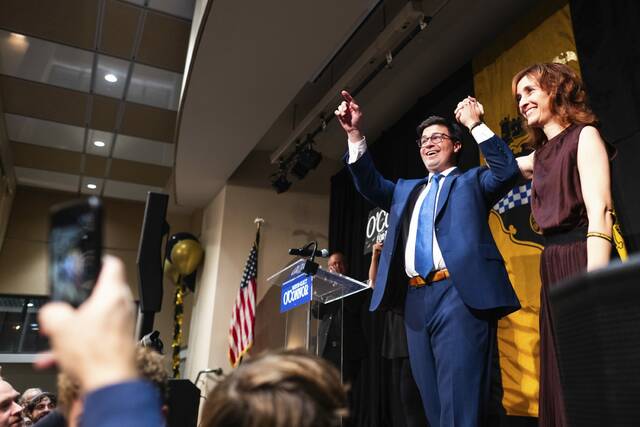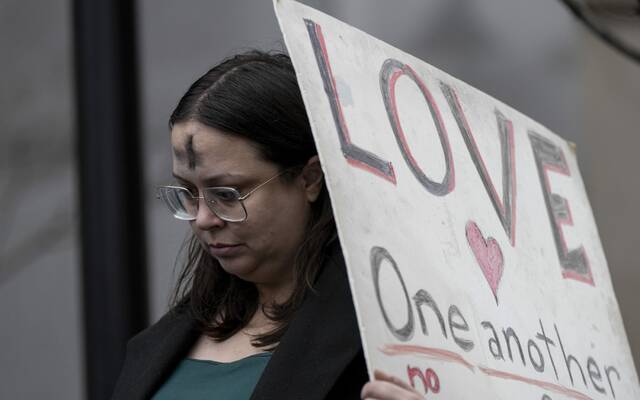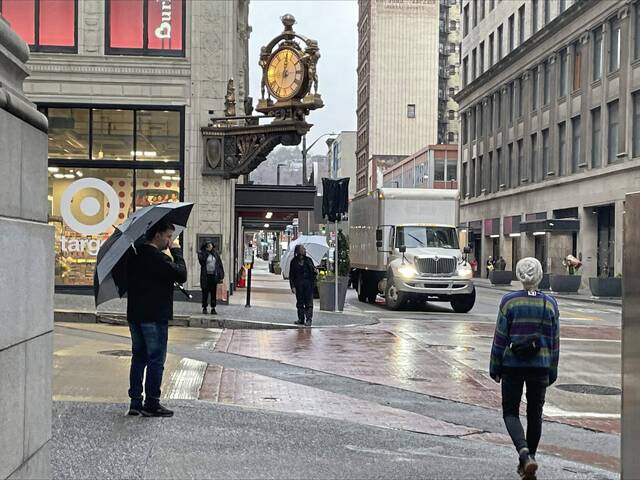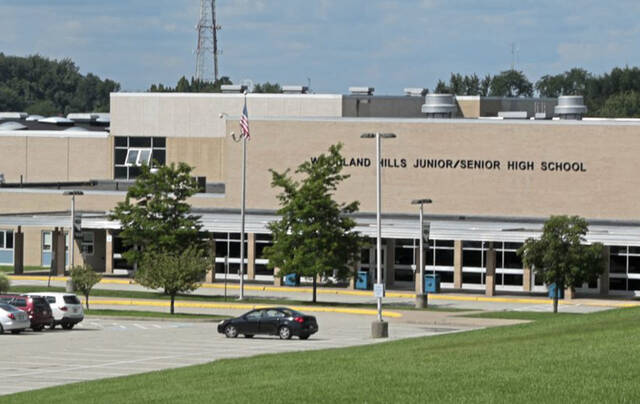Coming off a resounding election win Tuesday night, Corey O’Connor tempered his victory speech with a dose of reality.
“The road that we will travel is long and steeply uphill,” Pittsburgh’s mayor-elect warned a jubilant crowd of supporters.
Come January, O’Connor acknowledged, he will take over a city facing serious fiscal, operational and personnel challenges. It will be time to turn his campaign-trail talk into action.
O’Connor must navigate dwindling revenue, declining Downtown property values, an aging vehicle fleet and a police department that has seen its staffing sink to its lowest levels in two decades.
The mayor-elect campaigned on a pledge that Pittsburgh deserved better.
Bolstered by his experience as Allegheny County’s controller, O’Connor promised to bring fiscal accountability, foster economic growth and reinvigorate Downtown.
He also promised to install a permanent police chief following a merry-go-round of top cops under Mayor Ed Gainey.
None of those tasks will be easy. Even O’Connor’s staunchest supporters allow that he faces tremendous challenges.
“Their hands are tied,” Councilman Bob Charland, D-South Side, said of the incoming administration. “They are not set up for success by any means.”
Charland, who is often critical of outgoing Mayor Ed Gainey, noted many of the problems plaguing the city predate the current administration.
Gainey was held to one term in office after losing the Democratic primary to O’Connor in May.
“A lot of these problems were starting to show signs more than four years ago,” Charland said. “It’s unfair to think they’ll be able to solve all the problems of the last four years on day one.”
The city’s budget will be tight in the coming years. That could hinder O’Connor’s ability to launch new initiatives or invest in major projects, at least for the first year or two of his tenure, Charland said.
The mayor-elect has said he’ll hit the ground running, vowing to name a new police chief and other top officials before his January swearing-in.
“We know the work starts today,” he told reporters Wednesday morning.
Alison Dagnes, a political science professor at Shippensburg University, said voters likely don’t expect a new mayor to wave a magic wand and fix all of Pittsburgh’s problems. What voters want to see is someone who hears their concerns and shows he is working for residents.
“I think the way forward is actually doing what Josh Shapiro has done for the last three years, which is that your philosophy has to be get (stuff) done,” Dagnes said. “If the new mayor can show that he is working on the problems, then I think that that is a recipe for success.”
‘Hard decisions’
Gainey and City Council are tasked with passing a 2026 spending plan before O’Connor takes office, though O’Connor — with approval from a majority of council members — could amend that budget after taking office.
Fiscal pressures have been mounting, largely by declining values in Downtown commercial buildings following the pandemic. Making matters worse, the Pennsylvania Supreme Court recently struck down the city’s facility usage fee, a controversial tax on out-of-town professional athletes and performers, eliminating that annual revenue stream of roughly $4 million.
Some officials have raised concerns the preliminary budget the Gainey administration crafted is unrealistic and doesn’t allocate enough money for public safety overtime and the vehicle fleet.
O’Connor said Gainey on Tuesday night offered to launch a transition process. O’Connor said he needed to look at the city’s numbers to get a better idea of the fiscal situation he will inherit.
“We know that we have an unrealistic budget proposal from the mayor,” Councilman Anthony Coghill, D-Beechview, said. “We’re going to be millions and millions of dollars short in areas. We are going to have to make some hard decisions, whether it be cutting our workforce — or I don’t know what those (decisions) are yet, to be honest.”
But Coghill said he feels hopeful when he hears O’Connor offer potential solutions, like asking nonprofits to help pay for ambulances.
“When I hear things like that, I’m like, ‘Hallelujah,’” Coghill said.
Addressing the city’s financial problems must be O’Connor’s top priority, said Doug Shields, a former councilman who served as chief of staff to O’Connor’s father, Bob O’Connor, when he was a councilman.
When facing such an obvious issue, Shields said, “the priorities become self-evident.”
“If you don’t get your finances right, nothing else will work,” Shields said.
But Shields said O’Connor — who served a decade on City Council before taking his current role as Allegheny County controller — has experience in city government and budgeting that will be fundamental in the mayor’s office.
“The challenges that he has are not insurmountable,” Shields said.
Councilwoman Barb Warwick, D-Greenfield, said she wants to see the administration find a way to address the city’s problems without cutting the amenities that attract people to Pittsburgh, like its parks, swimming pools that are open all summer, traffic calming projects and programming at recreation and senior centers.
“Recognizing that we have some very tight years ahead of us, I want to ensure that we are not talking about austerity,” Warwick said. “The reason that Pittsburgh is such a great city for our current residents and such a desirable city for new residents is because we have such wonderful amenities.”
More woes
Beyond the 2026 spending plan that will be approved before O’Connor takes office, the mayor-elect will also have to continue budgeting for payments on a controversial affordable housing bond, which Gainey convinced a majority of council members to support.
The city will pay $62.5 million over 25 years on the bond, though some officials felt it was a bad deal, as it yielded only $31.6 million in spending power for the city’s Urban Redevelopment Authority.
Even as the city struggles to find funding for all of its essential needs, officials have warned Pittsburgh must find even more cash to invest in its aging vehicle fleet.
The fleet — including fire trucks, snowplows and ambulances — is in dire straits, officials have warned. The city would need to spend about $22 million per year to replace older and high-mileage vehicles, according to Fleet Manager Firmin Maurice, though the preliminary budget proposal for next year allocates not even half that.
“He’s going to have to focus on the fleet,” Coghill said. “That’s got to be front and center.”
O’Connor has suggested turning to major nonprofits — like hospitals and universities — to fund vehicles like ambulances. But getting nonprofits to chip in has been a challenge for many administrations.
Gainey sought to challenge in court the tax-exempt status of properties throughout the city owned by nonprofits.
O’Connor has not definitively said whether he would continue with any of the lawsuits, though his vision for attracting contributions from nonprofits revolves around asking them to voluntarily pay for specific needs aligned with their missions.
Public safety
Hiring a new police chief will be among O’Connor’s top priorities. This comes after the city has seen five permanent or acting chiefs during Gainey’s four-year tenure.
Some officials have raised concerns that the frequent leadership changes have hurt morale among rank-and-file officers and hindered efforts to bolster recruitment.
O’Connor will be tasked with bringing stability to the police bureau and addressing staffing challenges that have raised concerns among police union leaders and some elected officials.
Many officials have pegged the force’s ideal size around 900 officers.
Gainey has reduced the budgeted number of officers from 900 to 850, then 800, reflecting the city’s difficulty in recruiting and retaining officers. The city now is short of even the 800 figure.
Councilwoman Theresa Kail-Smith, D-West End, said public safety tends to be a top issue for voters.
She said she hopes O’Connor will prioritize safety and hiring a chief who has ties to the bureau and the respect of its officers.
Silver linings
But O’Connor doesn’t inherit only problems.
He also will lead the city as it hosts the 2026 NFL Draft in April, an event expected to draw hundreds of thousands of visitors.
“I think there’s a lot of opportunity here,” O’Connor said. “I think our job over the next couple months is to sell Pittsburgh again.”
He hopes to leverage the draft — which millions will watch — for positive publicity.
“There’s amazing places across the city of Pittsburgh,” Kail-Smith said. “Having a new mayor highlighting some of the things that he finds valuable and why he chose to raise his family here would be exciting for people to see.”
O’Connor and his wife, Katie, have two small children.
As Pittsburgh prepares for a mayoral transition, it’s also embarking on a transformation of its downtown.
Last year, Gov. Josh Shapiro joined local leaders in announcing a $600 million Downtown revitalization plan, much of which involves converting empty office space into mixed-income housing.
Also included are ongoing projects to renovate Market Square, upgrade Point State Park and create a new outdoor civic space called Arts Landing.
Those three projects are set to be completed in time for the draft.
O’Connor has pitched a slightly different vision for Downtown’s future than the largely residential plan championed by Gainey.
O’Connor has said affordable housing must be included, but he also wants to see a mix of new businesses, technology hubs and opportunities for local entrepreneurs.
He’ll have to juggle his desire to slash red tape and encourage development with the need to ensure existing residents aren’t priced out or displaced, Warwick said.
O’Connor faced criticism ahead of the May primary for accepting donations from developers, as some housing advocates feared that meant he would not prioritize affordable housing.
Warwick — who was a staunch supporter of Gainey ahead of the primary — said officials have to work together to address the city’s challenges and ensure a smooth mayoral transition.
“At the end of the day, no matter who you supported in the election, Mayor O’Connor’s success is Pittsburgh’s success,” Warwick said. “I want to see him do well because that’s what good for all the residents of the city.”








